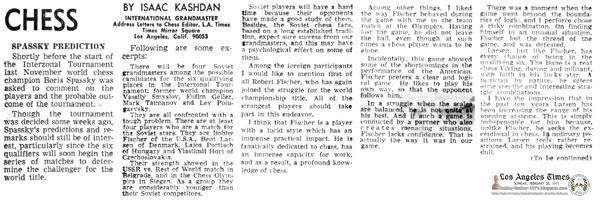The Los Angeles Times Los Angeles, California Sunday, February 28, 1971 - Page 88
Spassky Prediction
Shortly before the start of the Interzonal Tournament last November world chess champion Boris Spassky was asked to comment on the players and probable outcome of the tournament.
Though the tournament was decided some weeks ago, Spassky's predictions and remarks should still be of interest, particularly since the six qualifiers will soon begin the series of matches to determine the challenger for the world title. Following are some excerpts:
“There will be four Soviet grandmasters among the possible candidates for the six qualifying places in the Interzonal Tournament: former world champion Vassily Smyslov, Eufim Geller, Mark Taimanov and Lev Polugaevsky.
They are all confronted with a tough problem. There are at least four players who are a match for the Soviet stars. They are Bobby Fischer of the U.S.A., Bent Larsen of Denmark, Lajos Portisch of Hungary and Vlastimil Hort of Czechoslovakia.
Their strength showed in the USSR vs. Rest of the World match in Belgrade, and in the Chess Olympics in Siegen. As a group they are considerably younger than their Soviet competitors.
Soviet players will have a hard time because their opponents have made a good study of them. Besides, the Soviet chess fans, based on a long established tradition, expect sure success from our grandmasters, and this may have a psychological effect on some of them.
Among the foreign participants I would like to mention first of all Robert Fischer, who has again joined the struggle for the world championship title. All of the strongest players should take part in this endeavor.
I think that Fischer is a player with a lucid style which has an immense practical impact. He is fanatically dedicated to chess, has an immense capacity for work, and as a result, a profound knowledge of chess.
Among other things, I liked the way Fischer behaved during the game with me in the team match at the Olympics. Having lost the game, he did not leave the hall, even though at such times a chess player wants to be alone.
Incidentally, this game showed some of the shortcomings in the performance of the American. Fischer prefers a clear and logical game. He likes to play his own way, so that the opponent follows him.
In a struggle when the scales are balanced, he is not quite at his best. And if such a game is conducted by a partner who also creates menacing situations, Fischer lacks confidence. That is actually the way it was in our game.
There was a moment when the game went beyond the boundaries of logic, and I perforce chose a risky combination. On finding himself in an unusual situation, Fischer lost the thread of the game, and was defeated.
Larsen, just like Fischer, has ever chance of being in the qualifying six. The Dane is a real chess Viking, daring and militant, with faith in his lucky star. A tactician by nature, he offers some specific and interesting strategic combinations.
I have the impression that in the past few years Larsen has been increasing the range of his opening systems. This is simply indispensable for him because, unlike Fischer, he seeks the exceptional in chess. In ordinary positions Larsen feels rather restrained, and his playing becomes dull. (To be continued).
The Los Angeles Times Los Angeles, California Sunday, February 28, 1971 Times Problem 4062 by J. Haring. White mates in...
Posted by Bobby Fischer's True History on Wednesday, April 29, 2020
Times Problem 4062 by J. Haring. White mates in two.
FEN r1Rnn3/PP1kPPb1/B3p2p/2pP2qP/2P1N3/1K1R4/8/8 w - - 0 1
After White moves and Black replies, most mates are by promotion. It might be of interest to count how many.























